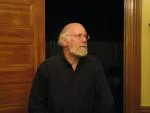
Transformed Social Interaction in Virtual Reality
Jeremy Bailenson, founding director of Stanford University's Virtual Human Interaction Lab and an associate professor in the Department of Communication at Stanford
Monday, January 25, 12:30 pm
Berkman Center, 23 Everett Street, second floor
RSVP required for those attending in person (kglemaud@cyber.harvard.edu)
This event will be webcast live at 12:30 pm ET and archived on our site shortly after.
This talk is part of The Psychology and Economics of Trust and Honesty speaker series, led by Berkman Fellow Judith Donath and hosted by the Berkman Center for Internet & Society’s Law Lab. For more related to Bailenson's talk, see this page.
From Jeremy:
In this talk, I describe a series of projects that explore the manners in which avatars (representations of people in virtual environments) qualitatively change the nature of remote communication. Unlike telephone conversations and videoconferences, avatars have the ability to systematically filter their physical appearance and behavioral actions in the eyes of their conversational partners, amplifying or suppressing features and nonverbal signals in real-time for strategic purposes. These transformations have a drastic impact on interactants' abilities to influence others in social and professional contexts.
About Jeremy
Jeremy Bailenson is founding director of Stanford University's Virtual Human Interaction Lab and an assistant professor in the Department of Communication at Stanford. He earned a B.A. cum laude from the University of Michigan in 1994 and a Ph.D. in cognitive psychology from Northwestern University in 1999. After receiving his doctorate, he spent four years at the Research Center for Virtual Environments and Behavior at the University of California, Santa Barbara as a Post-Doctoral Fellow and then an Assistant Research Professor.
Bailenson's main area of interest is the phenomenon of digital human representation, especially in the context of immersive virtual reality. He explores the manner in which people are able to represent themselves when the physical constraints of body and veridically-rendered behaviors are removed. Furthermore, he designs and studies collaborative virtual reality systems that allow physically remote individuals to meet in virtual space, and explores the manner in which these systems change the nature of verbal and nonverbal interaction.
His findings have been published in over 70 academic papers in the fields of communication, computer science, education, law, political science, and psychology. His work has been consistently funded by the National Science Foundation for over a decade, and he also receives grants from various Silicon Valley and international corporations. Bailenson consults regularly for government agencies including the Army, the Department of Defense, the National Research Council, and the National Institute of Health on policy issues surrounding virtual reality.
Links
You might also like
- communityOn Software Bugs and Legal Bugs




